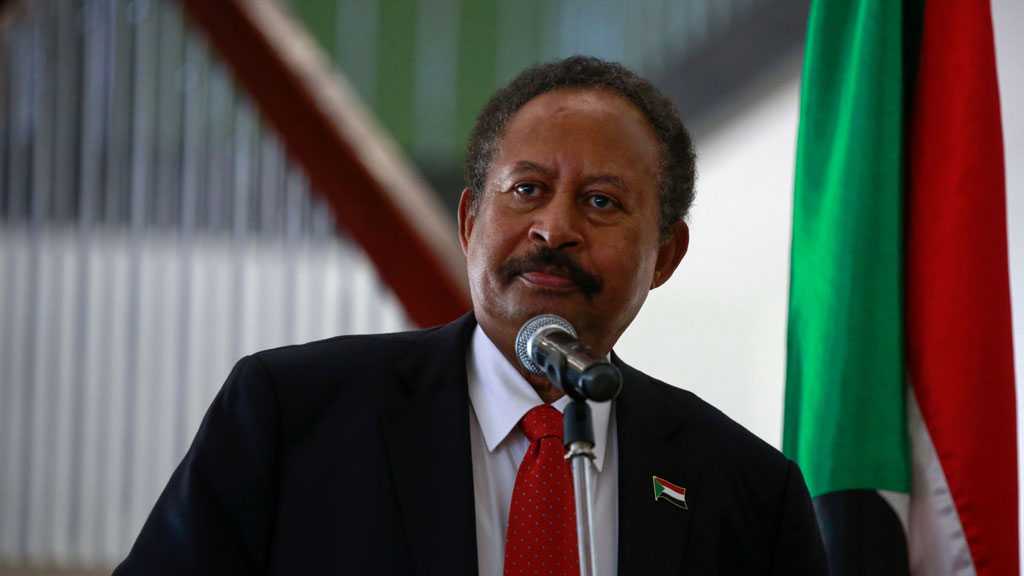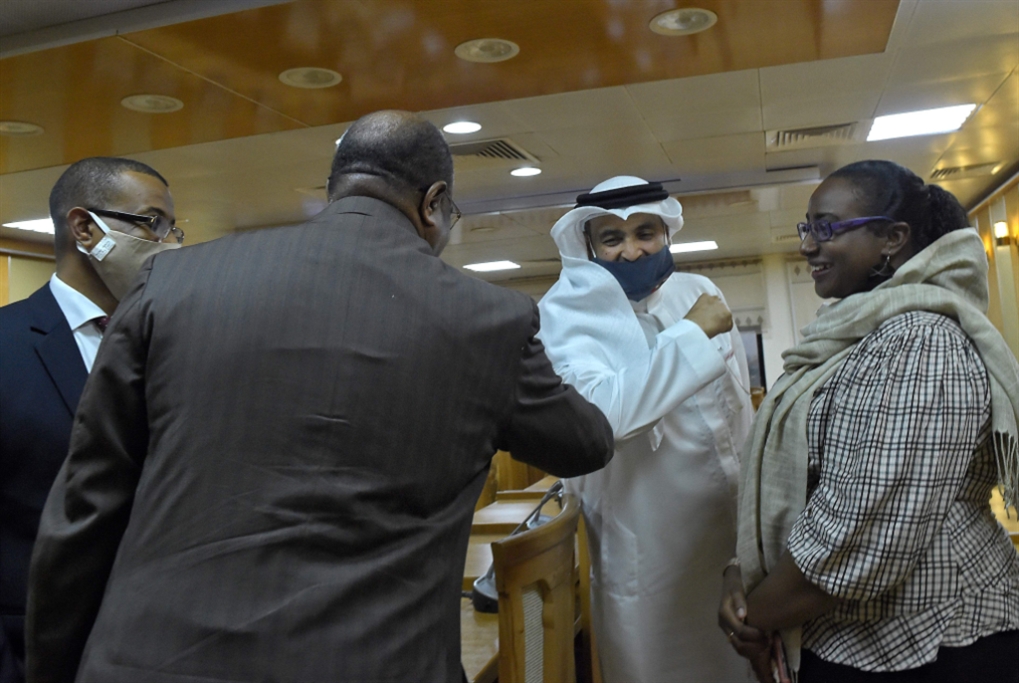
By Mai Ali – Al-Akhbar Newspaper
Translated by Staff
Quickly encouraged by the US and UAE, Sudan is about to normalize relations with “Israel”, in the light of a civilian-military agreement to move in that direction, after the transitional government had tried to suggest that it had nothing to do with this issue. The marathon negotiations that aim to finalize the normalization file are held in Abu-Dhabi, in the middle of many American baits to Khartoum, starting with lifting sanctions and freeing it from the “foolishness” of terrorism.
Khartoum | In the midst of silence on the part of the transitional government, the head of Sudan’s “Sovereignty Council”, General Abdel Fattah al-Burhan, engaged in three party-negotiations in Abu-Dhabi, capital of the United Arab Emirates [UAE], which involved, together with Sudan, the US and UAE. The negotiations treated a specific agenda that primarily included normalizing relations between Khartoum and Tel Aviv.
Although Abdallah Hamdok’s government washed it hands of the meeting between Burhan and the “Israeli” Prime Minister Netanyahu in Uganda’s Entebbe seven months ago, the presence of the Minister of Justice, Nasruddin Abdul Bari, among the delegation headed by al-Burhan in Abu-Dhabi two days ago, created a remarkable paradox. It comes especially that Abdul Bari has engaged, immediately upon arrival to the Emirati capital, in direct negotiations with a US administration team about lifting sanctions on Sudan, supporting the transitional period, exempting Sudan from American debts, and urging the “friendly” States to take similar steps towards it.
Thus, it appeared, for the first time, that there was obvious and public harmony between the civilian government and military component, especially after the head of Sudan’s “Sovereignty Council” had met, at his office last week, with the Minister of Justice, before they went to the UAE where they discussed the legal issues concerning lifting sanctions that the US has been imposing on Sudan since 1977 and removing Sudan from “the list of State Sponsors of Terrorism”. They also discussed the measures that these actions could require, and that Abdul Bari had started earlier by holding meetings with officials and jurists in Washington, which resulted in Sudan’s government approval for paying financial compensations for the families of the victims of the American destroyer “USS Cole”.
Concerning what observers considered to be a distribution of roles, Minister of Information, Muhammad Saleh, denied that the ministerial delegation accompanying al-Burhan had the mandate to discuss normalization with “Israel”, reiterating that the transitional government didn’t have any authorization by the Legislative Council to take decisions in such matters, which are among the tasks of an elected government. He added that the ministerial delegation was in Abu-Dhabi just to discuss removing Sudan from the “list of State Sponsors of Terrorism” and lifting economic sanctions on Sudan.
The head of Sudan’s “Sovereignty Council” is trying to promulgate that a country under sanctions could never dispose of them unless it normalizes with “Israel”. He had already justified his meeting with Netanyahu last February by saying that it was on the basis of “his responsibility and sense that hard work was crucial to maintain Sudan’s national security and ensure the highest interests of Sudanese people.”
This time, the proof seems clearer. He set the price that he wants in return for accepting normalization. It consists of a financial support worth $1,2 billion, earmarked for wheat and oil; a $2 billion grant or a 25-year loan; a commitment to provide Khartoum with economic aid from the UAE and the US; and the removal of Sudan from “the list of State Sponsors of Terrorism”, which was at the forefront of the Sudanese delegation’s demands. Some analysts considered that these demands were like a bait that the administration of US President, Donald Trump, threw to the Sudanese government to push it towards accepting normalization. In this context, a diplomatic source described, in a conversation with “al-Akhbar”, what the US was doing as a “notorious and exposed political blackmail”, and added that, however “Washington and Tel Aviv have wanted to obtain normalization at no cost”. The source added that “the military component was moving towards normalization, and it seemed that the civilian government had accepted on condition that it receives a cost, in other words, if normalization had a price, there would not be anything wrong with it.”
Trump’s administration is active, at the very highest level, to finalize the file concerning normalizing relations between Khartoum and Tel Aviv. This was obvious since the visit of US Secretary of State, Mike Pompeo, to Sudan last month, which fell within the frenetic endeavors of the current administration to ensure benefits that would help its President to achieve additional points in the expected electoral race. Thus, this administration scrambled to circumvent any possible pretext that Hamdok’s government might use, noted that the efforts of its broker, i.e. the Emirati ally, were early focused on the military component in the “Sovereignty Council”, on the grounds that the military was the closest to the UAE since the era of the former regime. Accordingly, there is concern that the current path leads to, as well as to open the door to “Israel”, enhance the Emirati intervention in Sudanese internal affairs. This is what the diplomatic source describes saying that “what the UAE was doing was more than intervention; Abu-Dhabi was leading and making decisions concerning the Sudanese affairs”, pointing out that “the military was, with or without knowledge, following the UAE that was pushing it towards finalizing the normalization file.”
السودان على خطى الإمارات: التطبيع مقابل القمــح والنفط
مي علي
الأربعاء 23 أيلول 2020

بدفعٍ أميركي – إماراتي حثيث، يقترب السودان، أكثر فأكثر، من تطبيع علاقاته مع إسرائيل، في ظلّ توافق مدني – عسكري على المضيّ في هذا الاتجاه، بعدما حاولت الحكومة الانتقالية الإيحاء بأن لا يدَ لها في ذلك. المفاوضات الماراثونية الهادفة إلى حسم ملفّ التطبيع السوداني منعقدة في أبو ظبي، وسط كثرة الطعوم الأميركية الملقاة إلى الخرطوم، وفي مقدّمها رفع العقوبات عنها وتخليصها من «لوثة» الإرهابالخرطوم | وسط صمت من جانب الحكومة الانتقالية، ينخرط رئيس «مجلس السيادة» السوداني، عبد الفتاح البرهان، في مباحثات ثلاثية في العاصمة الإماراتية أبو ظبي، تضمّ، إلى جانب السودان، كلّاً من الولايات المتحدة الأميركية والإمارات، وتتناول أجندة محدّدة، على رأسها ملفّ تطبيع العلاقات بين الخرطوم وتل أبيب. وعلى رغم تنصّل حكومة عبد الله حمدوك، سابقاً، من اللقاء الذي جمع البرهان برئيس الوزراء الإسرائيلي، بنيامين نتنياهو، في عنتيبي الأوغندية قبل سبعة أشهر، إلّا أن حضور وزير العدل، نصر الدين عبد الباري، ضمن وفد البرهان الموجود منذ يومين في أبو ظبي، يمثّل مفارقة لافتة، وخصوصاً أن عبد الباري انخرط، فور وصوله الى العاصمة الإماراتية، في تفاوض مباشر مع فريق مِن الإدارة الأميركية موجود هناك حول رفع العقوبات عن السودان، ودعم الفترة الانتقالية فيه، وإعفائه من الديون الأميركية، وحثّ الدول «الصديقة» على اتخاذ خطوات مماثلة تجاهه.
هكذا، بدا، هذه المرّة، أن ثمّة تناغماً واضحاً وعلنياً بين الحكومة المدنية والمكوّن العسكري، ولا سيما بعدما اجتمع رئيس «مجلس السيادة»، في مكتبه الأسبوع الماضي، بوزير العدل، قبل ذهابهما إلى الإمارات، وتباحثا في المسائل القانونية في ما يخصّ رفع العقوبات الاقتصادية التي تفرضها الولايات المتحدة على السودان منذ عام 1997، إلى جانب إزالة اسم السودان من «قائمة الدول الراعية للإرهاب»، وما يستدعيه ذلك من خطوات إجرائية كان قد بدأها عبد الباري، في وقت سابق، بعقده لقاءات مع مسؤولين وقانونيين في واشنطن، تَمخّضت عنها موافقة الحكومة السودانية على دفع تعويضات ماليّة لأسر ضحايا المدمّرة الأميركية «كول». وفي ما عدّه مراقبون نوعاً من توزيع الأدوار، خرج وزير الإعلام، فيصل محمد صالح، لينفي أن يكون الوفد الوزاري المرافِق للبرهان يحمل تفويضاً بمناقشة التطبيع مع إسرائيل، مكرّراً القول إن الحكومة الانتقالية لا تحمل تفويضاً من المجلس التشريعي يمنحها الحق في اتّخاذ قرارات مماثلة، وإن تلك القرارات من اختصاصات الحكومة المنتخبة. وأضاف صالح إن الوفد الوزاري الموجود في أبو ظبي ذهب لبحث رفع اسم السودان من «قائمة الإرهاب» ورفع العقوبات الاقتصادية عنه.
مصدر دبلوماسي: ما تقوم به الولايات المتحدة «ابتزاز سياسي مفضوح»
على أن الخروج من شرنقة العقوبات لا يكون إلّا من بوابة التطبيع وفق ما يروّج له رئيس «مجلس السيادة»، والذي سبق أن برّر لقاءه نتنياهو في شباط/ فبراير الماضي بأنه جاء انطلاقاً من «مسؤوليته واستشعاره بأهمية العمل الدؤوب لحفظ أمن الأمن الوطني السوداني وصيانته، وتحقيق المصالح العليا للشعب السوداني». أمّا هذه المرّة، فقد بدا البرهان أكثر وضوحاً، إذ وضع أمام مفاوضيه الثمن الذي يطلبه مقابل الموافقة على التطبيع، والمُتمثّل في دعم مالي قيمته 1,2 مليار دولار مخصّص للنفط والقمح، ومليارا دولار في صورة منحة أو قرض لمدة 25 عاماً، بالإضافة إلى الالتزام بتقديم مساعدات اقتصادية إماراتية وأميركية للخرطوم، فضلاً عن إزالة اسم السودان من «لائحة الإرهاب»، والتي تتصدّر مطالب الوفد السوداني. مطالبُ اعتبرها محلّلون بمثابة الطُّعْم الذي رمت به إدارة الرئيس الأميركي، دونالد ترامب، للحكومة السودانية لدفعها إلى قبول التطبيع. وفي هذا الإطار، يصف مصدر دبلوماسي، في حديث إلى «الأخبار»، ما تقوم به الولايات المتحدة بـ»الابتزاز السياسي المفضوح وغير الخفيّ»، مستدركاً بأن «واشنطن وتل أبيب تريدان الحصول على التطبيع من دون دفع أيّ شيء مقابل ذلك». ويضيف المصدر إن «المكوّن العسكري الآن يمضي في اتجاه التطبيع، والحكومة المدنية يبدو أنها وافقت مقابل أن تقبض الثمن، بمعنى أنه إذا وُجد مقابل للتطبيع فلا بأس في ذلك».
وتنشط إدارة ترامب، على أعلى المستويات، لإنهاء ملفّ تطبيع العلاقات بين الخرطوم وتل أبيب. وهو ما بدا واضحاً منذ الزيارة التي أجراها وزير الخارجية الأميركي، مايك بومبيو، إلى السودان، الشهر الماضي، والتي تندرج في إطار المساعي المحمومة للإدارة الحالية لتحقيق مكاسب تساعد رئيسها في تحقيق نقاط إضافية في السباق الانتخابي المنتظر. ولذا، سارعت هذه الإدارة إلى الالتفاف على أيّ حجج يمكن أن تتذرّع بها حكومة حمدوك، علماً بأن جهود وسيطها، أي الحليف الإماراتي، انصبّت باكراً في اتجاه المكوّن العسكري في «المجلس السيادي»، على اعتبار أن العسكر كانوا هم الأقرب إلى الإمارات منذ عهد النظام السابق. ومن هنا، يُخشى أن يؤدي المسار الحالي، فضلاً عن فتح الأبواب لإسرائيل، إلى تعزيز حضور الإمارات في الشأن الداخلي السوداني. وهو ما يعبّر عنه مصدر دبلوماسي بالقول إن «ما تقوم به الإمارات تَعدّى مرحلة التدخل إلى مرحلة أصبحت فيها أبو ظبي تقود وتقرّر في الشأن السوداني»، مشيراً إلى أن «العسكريين منقادون خلفها بعلم منهم أو من دون علم، وتدفعهم الحماسة إلى إنهاء ملفّ التطبيع».
اشترك في «الأخبار» على يوتيوب هنامن ملف : ربيع إسرائيل في أفريقيا: السودان على خطى الإمارات












No comments:
Post a Comment